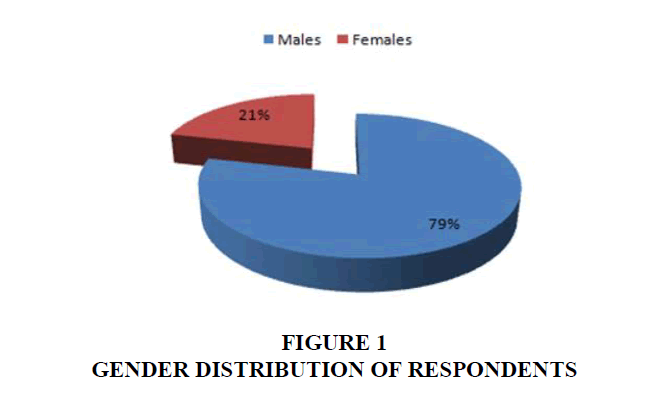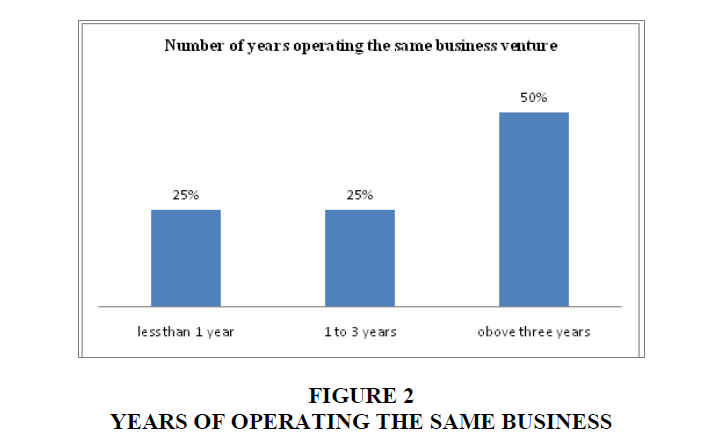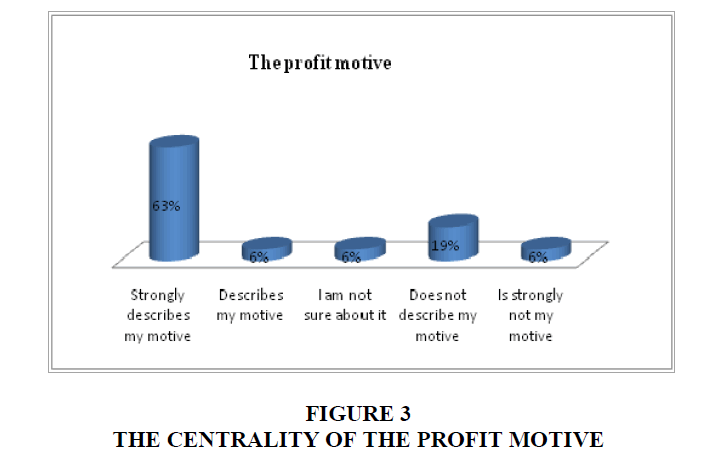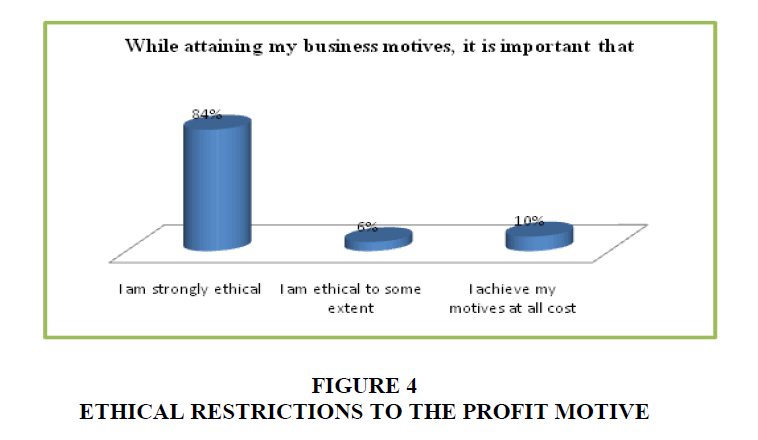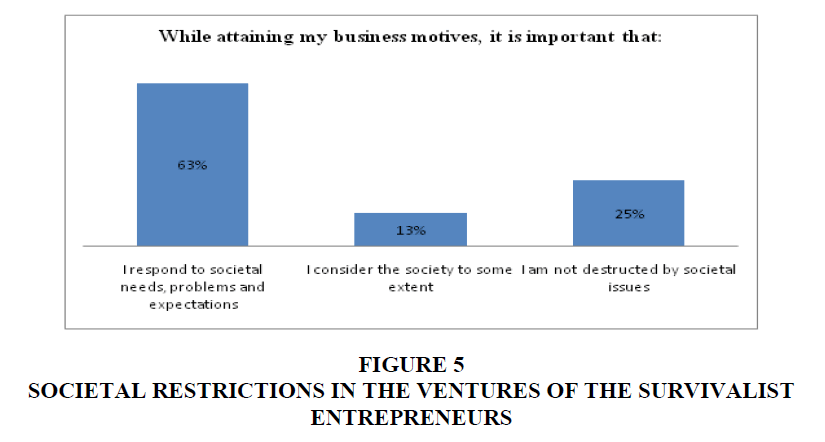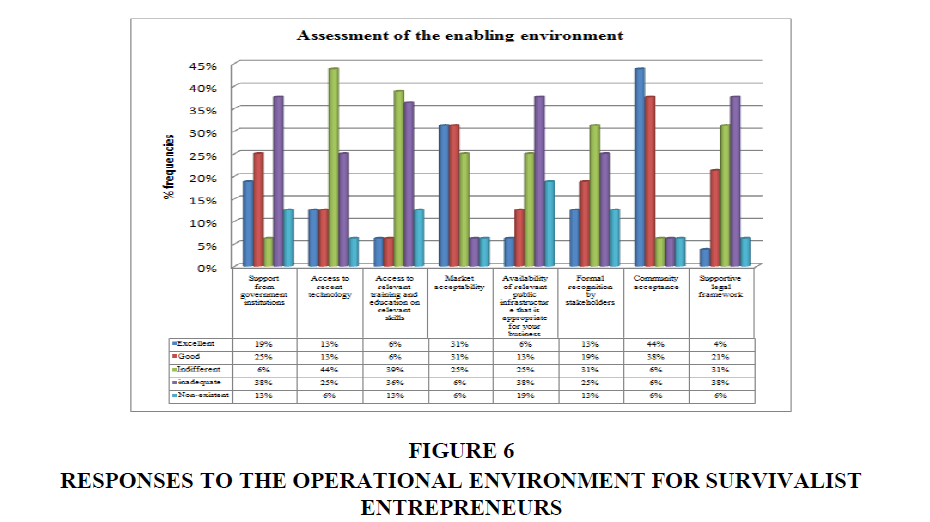Research Article: 2021 Vol: 27 Issue: 3S
The Profit Motive and the Enabling Environment for Growth of Survivalist Township Entrepreneurship: A Study at A Township in Cape Town
Samson Nambei Asoba, Walter Sisulu University
Nteboheng Mefi Patricia, Walter Sisulu University
Abstract
The paper draws attention to the profit motive in respect of survivalist entrepreneurship at a township environment in Cape Town. Survivalist entrepreneurs have received little specific focus yet they represent a significant portion of economic activities in South Africa townships. Essentially the study considers the problem of failure to grow among survivalist entrepreneurs as reported in related literature. Many survivalist entrepreneurs fail to grow beyond the survivalist phase and there is no consensus on the underlying cause for such a phenomenon. With the Covid-19 pandemic, there is an expectation that survivalist entrepreneurs are likely to multiply owing to the collapse of many small businesses as well as the loss of employment arising from the pandemic. Two specific objective were formulated for the study: (1) to inquire into the business motives of survivalist entrepreneurs and (2) to assess the perception of the survivalist entrepreneurs on the degree to which the small business environment in supportive of motive attainment. The study adopted a quantitative research design based on the selection of respondents using a convenience sampling strategy. The evidence established from this study suggest that survivalist entrepreneurs do not pursue the profit motive significantly but they faced inhibitions presented by the economic environment in which they operate. Government and other stakeholders in the national economy are recommended to develop a suitable legal and institutional framework with strong structures to ensure the growth of survivalist entrepreneurs.
Keywords
Survivalist Entrepreneur, Township Entrepreneurship, Profit Motive, Small Businesses.
Introduction
Little is known about survivalist entrepreneurs yet they play a significant role in reducing unemployment and poverty especially in black South African Townships (Iwu et al., 2016). Of greater concern are the observations that many small business initiatives either fail to grow or collapse yet there is greater recognition than ever that small business are the key to South Africa’s economic challenges (Choto et al., 2014). The general position in business literature is that most private businesses operate for the attainment of a profit. It is, therefore hypothetical that those businesses that are profit driven are bound to fail and collapse if the profit is not realized. Survivalist entrepreneurs present a particular case for analysis. They simply survive with no growth. This calls for research inquiry into their business motives and whether the environment is consistent with their motive. One would postulate that if survivalist entrepreneurs are profit driven and the environment is supportive then they should grow over the years. It is also a probable conjecture that, profits gained are likely to be used for the growth of the survivalist business so that it moves to a recognizable small business which will use its profits for further growth. Given the above arguments, the present study was formulated: (1) to inquire into the business motives of survivalist entrepreneurs and (2) to assess the perceptions of the survivalist entrepreneurs on the degree to which the small business environment is supportive of motive attainment. These objectives are expected to ensure that survivalist’s entrepreneurs are well understood and to establish the nature of support that they need so that they can grow. It should also be understood that survivalist entrepreneurs are likely to have increased owing to the Covid-19 pandemic as many people are expected to lose their jobs with many businesses collapsing. There appears to exist a critical need to foster an appreciation of survivalist entrepreneurs and ensure that they grow.
Statement of the Problem and Research Objectives
Despite their significance to South Africa, most survivalist entrepreneurs collapse in their first years or simply fail to grow and remain on the survivalist level (Choto et al., 2014; Iwu et al., 2016). The failure to grow of the survivalist entrepreneurs seem to represent a missed opportunities for the South African economy. Given the above arguments, the present study was formulated: (1) to inquire into the business motives of survivalist entrepreneurs and (2) to assess the perceptions of the survivalist entrepreneurs on the degree to which the small business environment is supportive of motive attainment. These objectives are expected to ensure that survivalist’s entrepreneurs are well understood and to establish the nature of support that they need so that they can grow. It should also be understood that survivalist entrepreneurs are likely to have increased owing to the Covid-19 pandemic as many people are expected to lose their jobs
Literature Review
Survivalist Entrepreneurs and the Profit Motive
Interest in Micro, Medium and Medium Enterprises (MSMEs) is growing worldwide. Many countries including South Africa are doubling their efforts in promoting MSMEs. Even though notable initiatives have been undertaken to strengthen small businesses in South Africa, the MSMEs sector remains troubled with high failure rate, stagnancy and decline (Small Enterprises Development Agency [SEDA], 2019). Kepar (2000) noted that in many industrialized nations, there is greater recognition of the role of MSMEs in economic prosperity. Echoing the same view, South Africa. Department of Small Business Development [DSBD] (2020) posited that small businesses have the capacity to reduce unemployment, growth the Gross Domestic Product (GDP) of South Africa and ensure economic prosperity. This scenario provides a solid background for the need to essentially unravel the motives that drive survivalist entrepreneurial ventures. In an exposition of the nature of business motives, Diener (2016) stresses that despite the importance of pursuing the profit motive, businesses are restricted by legal, societal and ethical virtues that prevails in the business environment. Earlier, noted controversy in what drives entrepreneurs and the motives that they pursue and emphasizes that some entrepreneurs follow ego motives while others simply engage in business just to survive for the day. Some sections of the literature seem to study the motives of entrepreneurs from the Corporate Social Responsibility (CSR) framework. In particular, Garst et al. (2017) noted arguments in CSR scholarship emphasizing that enterprises follow societal, ethical, legal and economic motives and in doing so, profit tend to arise inevitably. These arguments seem to indicate that where the profit motive drive business, it may not be realized unless societal, legal and ethical dictates of a society are adhered. On the other side, pursuing legal, societal and ethical motives is likely to generate profit. These arguments are essential in framing out the operations of survivalist entrepreneurs scattered around many South African townships.
The Enabling Environment for Survivalist Entrepreneurs
Thebe and Ncube (2015) referred to survivalist entrepreneurship as street entrepreneurs who operate informally and at such a micro level so as to lack basic infrastructure for their business as well as formal authorities from authorities. Ranyane (2015) also postulated in line with Thebe and Ncube (2015) and highlighted that survivalist entrepreneurs in South Africa reflects the economic marginalization of black townships in the apartheid era. After the attainment of democracy in South Africa, black people faced resource challenges to fully participate in the economy which had been opened up for them. Choto et al. (2014) noted that survivalist entrepreneurs face a tough operational environment characterized by lack of formal recognition, limited government support as well as poor infrastructure and other resources required for them to operate, sustain and grow. In the literature, growth of survivalist is viewed from economic, psychological, sociological and cultural theories. Simpeh (2011) asserted that entrepreneurship the growth of small businesses can be evaluated from eight (8) theories, namely: economic theories, psychological entrepreneurship theories, sociological entrepreneurship theories, anthropological entrepreneurship theories, opportunity focused entrepreneurship and resource based entrepreneurship theories. Whereas economic theories focus on the economic state as a factor in the growth of entrepreneurship, other views such as cultural and psychological qualities of the entrepreneur have also been found to be critical. This study assessed the growth of survivalist entrepreneurs from an economic perspective based on the profit motive as well as from ethical and other societal considerations. It also considers the nature of the operational environment to assess its suitability to the achievement of growth objectives.
Theoretical Framework
The study of survivalist entrepreneurs can be viewed from many theoretical frameworks just like most business phenomena. Bandura’s (2001) social theory as well as Locke and Lathama’s goal setting theories offer important propositions which which applied to survivalist entrepreneurs increases deeper understanding and meaning. Iwu et al.(2016) also commented that these theories offer greater insights on the nature of survivalist businesses. In terms of Locke and Latham’s (2006) theory, goals determine how actions and the intensity of those actions. In the same way, one can claim that survivalist entrepreneurs lack strong profit related goals to drive their growth and so remain on the survivalist level. Iwu et al. (2016) echoed the goal setting theory when they argued that goals determine performance depending on their nature. Goals serve as standards of self-satisfaction with harder goals demanding higher accomplishment in order to attain self-satisfaction than easy goals (Locke, 1995). In terms of Bandura’s (2001) self efficay theory, individuals achieve based on the strengths of their self-belief as well as the need to attain a socially favourable condition. As such entrepreneurs are likely to pursue the profit motive if they recognise it’s worthy and have the will to attain it.
Research Methodology
In their critical discussion of research paradigms, Karatas-Özkan and Murphy (2010) impressed that all social enquiry emanate from certain key philosophical positions which guide the whole design. In concurrence, Creswell and Creswell (2018) echoed the same views and posit that researches adhere to certain worldviews or ontological and epistemological assumptions which shape the way they conduct a research. Major research traditions have been associated with the objectivist and subjectivist research paradigms as well as the pragmatic research paradigm that has often advocated for organic research procedures involving mixed designs. This study aimed to collect data on the business motives of survivalist entrepreneurs as well as their perceptions on the suitability of the environment for the attainment of their goals. A quantitative social survey design based on self-rating was considered appropriate for the collection of data on the business motive of the survivalist entrepreneurs. The self-rating system used almost resembled Likert items to gauge level of agreement of respondents. The Covid-19 pandemic has presented restrictions in the manner in which data collection can proceed. Therefore an electronic social survey was deemed suitable in these situations as it honoured the objectives of the study as well as ensured the collection of data in line with lockdown restriction guidelines which prohibited face to face interactions. The data collection instrument was a self-rater chart which was designed based on the literature review that was conducted earlier. Convenience sampling was adopted for the selection of a township from which survivalist entrepreneurs could be conducted to provide data. The data was collected from survivalist township entrepreneurs operating in the township where the researcher resides in Cape Town. In order to identify respondents, a social media group of an association of all the micro entrepreneurs operating in the township was joined and the researcher introduced the study to the group members after which those who were willing to participate in the study were later conducted individually by email. The group was composed on one hundred and thirty five (135) micro entrepreneurs and eighty of them successfully participated in the study
Findings and Discussion
Figure 1 shows the gender distribution of the survivalist entrepreneurs of the respondents. Most (79%) of the respondents were males while twenty one percent (21%) were females. These findings were in concurrence with global observations that males dominate the entrepreneurial space in many countries even though female entrepreneurship has been observed to be on the rise lately (Global Entrepreneurial Monitor, 2019/2020) As shown in Figure 2, most (40%) of the respondents were involved in computer and information technology products and services while the least were involved in construction and building enterprises. In terms of the age, the majority (60%) were within the 20 to 45 years age group. The nature of business and age groups of the respondents are provided in Table 1. Notable from the Table 1 is the multi-sectoral nature of the survivalist entrepreneurs. It appears that they engaged in more than one line of business at any time. In terms of age distribution, the youthful nature of survivalist entrepreneurs was observed with the majority (60%) being within the 20 to 45 years age range.
| Table 1: Nature Of Business And Age Distribution Of Respondents | ||
| Nature of business | Computer and information technology products and services | 40% |
| Agriculture products and services sector | 32% | |
| General merchandise sector | 30% | |
| Personal services | 35% | |
| Construction and building services | 5% | |
| Transport and communication sector | 15% | |
| Food and restaurant operations | 25% | |
| Other | 30% | |
| Age | Less than 20 years | 30% |
| 20 to 45 years | 60% | |
| Above 45 years | 10% | |
The survivalist nature of the entrepreneurs was evident as half of them have been operating the same business venture without growth for above three (3) years. In other word, they have not grown and reflected the same business size for more than 3 years.
The respondents’ reflection of their motives in running their businesses seemed to have a strong profit orientation with sixty three percent (63%) of the respondent indicating that the profit strongly described their business motive. It also appears that a notable number (19%) of the respondents felt that the profit motive only does not fully resemble their motive in business shows in Figure 3.
Figure 4 shows the results from the respondents the ethical restrictions that the survivalist entrepreneurs adhered to in trying to achieve the profit motive. The majority (84%) of the respondents strongly believed that they are ethical in achieving the profit extent. Showing that in their pursuance of the profit motive the respondents were mostly guided by certain ethical guidelines
The consideration of other societal restrictions in the ventures of the survivalist entrepreneurs who participated in this study was evident as shown in Figure 5. A significant percentage (63%) of the eighty respondents mentioned that they responded to societal needs, problems and expectations as they conducted their business activities. Furthermore, twenty five percent (25%) felt that they are destructed by the societal activities in pursuance of the profit motive
The results above seem to suggest that survivalist entrepreneurs pursue the profit motive predominantly while at the same time ensuring special adherence to certain ethical and societal virtues. It should be presumed that the profit motive should propel the growth of survivalist entrepreneurs provided that the operational environment is supportive and favorable. As such, it was essential for the study to make an assessment of the operational environment as shown on the coding chart presented below as Table 2.
| Table 2: Operational Environment Assessment Chart | ||||||
| Excellent | Good | Indifferent | Inadequate | Non-existent | Total | |
| Support from government institutions | 15 | 20 | 5 | 30 | 10 | 80 |
| Access to recent technology | 10 | 10 | 35 | 20 | 5 | 80 |
| Access to relevant training and education on relevant skills | 5 | 5 | 31 | 29 | 10 | 80 |
| Market acceptability | 25 | 25 | 20 | 5 | 5 | 80 |
| Availability of relevant public infrastructure that is appropriate for your business | 5 | 10 | 20 | 30 | 15 | 80 |
| Formal recognition by stakeholders | 10 | 15 | 25 | 20 | 10 | 80 |
| Community acceptance | 35 | 30 | 5 | 5 | 5 | 80 |
| Supportive legal framework | 3 | 17 | 25 | 30 | 5 | 80 |
Figure 6 is a pictorial representation of Table 2. In terms of support from the government, the respondents strongly felt that this was inadequate (38%). These results echo those of Ranyane (2015) whose study found that survivalist entrepreneurs suffer from limited support from government institutions and recommended that the government should create institutions and policies to smoothen the registration, financing and operation of survivalist entrepreneurs. Most of the survivalists (44%) were indifferent on their access to technology. They were not sure whether it was good or bad. This seems to be consistent with Lose and Kapondoro’s (2020) findings that technological adoption among small businesses and entrepreneurs seem to be in its early adoption and persuasion stage. It actually seems that the survivalist entrepreneurs have limited appreciation of the essentially of technology in growing their businesses.
Furthermore, Figure 6 shows that the survivalist entrepreneurs were mainly (39%) indifferent to their access to and adequacy of education and training on business matters. These results support those of Ranyane (2015) as well as those of Choto et al. (2014). There were indications that survivalist entrepreneurs have notably good access to markets coupled by high acceptability of their products and services (Asoba, 2014; Asoba 2020). This could be because of their nearness and closeness to households and communities. As in Choto et al. (2014) and Ranyane (2015), this study found evidence that survivalist entrepreneurs faced challenges in accessing adequate infrastructure and other resources for their operations. This could be a major limiting factor for growth. The survivalist entrepreneurs were also not sure on how individuals perceived them and they were indifferent on the formality and informality status of their recognition. It was also found that survivalist entrepreneurs faced high community acceptance owing to their closeness to the market. The majority (38%) of the participants also felt that the legal environment in which they operate was inadequate while a large number (31%0 were not sure.
Recommendations
Following the findings of this study, survivalist entrepreneurs are encouraged to collaborate and lobby for government support and also the improvement of their operational environment. Survivalist entrepreneurs are also recommended to take advantage of their community acceptance and proximity to clients to attain sustainable competitive advantage which can be favorable for their growth. It is also recommended that survivalist entrepreneurs should quickly embrace recent technologies and use them to foster growth. Future research could focus on technological acceptance adoption among survivalist entrepreneurs.
Conclusion
The study was formulated to explore the motives of survivalist entrepreneurs at a township in Cape Town as well at assess the suitability for growth of the environment in which these entrepreneurs operate. Evidence was found that survivalist entrepreneurs pursue the profit motive but cannot grow owing to the challenges they face from the environment that they operate. In pursuing the chief motive of profit, the study also found that survivalist entrepreneurs also face ethical and societal restrictions. The chief environmental challenge that this study has found related to inadequate infrastructure, inadequate educational support as well as lack of government support through relevant institutions, policies and legal framework. The results of the study also established that survivalist entrepreneurs have been slow in harnessing technology for their businesses and also lacked formal recognition which could translate to discrimination in the market environment. Some of the positive things from the environment that were established in this study included their community acceptability and proximity to the market which favoured growth.
Implications for Future Studies
Future research may need to inquire into the ethnic dimension of survivalist entrepreneurship in South Africa and establish its implication on the transition from micro to medium sized enterprises. These study referred to the goal setting theory and the social theory in interpreting the literature review, future studies may focus on other theories such as the cultural theory or the systems theory.
References
- Asoba, S.N. (2014). Factors influencing the growth of African immigrant-owned business in selected craft markets in the Calie metroliolitan area of South Africa. Unliublished Master Thesis. Calie lieninsula University of Technology: Calie Town.
- Asoba, S.N. (2020). &nbsli;A business framework for the growth of immigrant craft enterlirises in Calie Town. Unliublished lihD Thesis. University of Johannesburg: Johannesburg.
- Asoba, S.N., &amli; Mefi, N. (2020). Theories of immigrant entrelireneurshili in the South African context. Academy of Entrelireneurshili, 1099-9264.
- Keliar, A. (2000). Failing or not aiming to grow? Manufacturing MSMEs and their contribution to emliloyment growth in South Africa. TIliS: Johannesburg.
- South Africa. Deliartment of Small Business Develoliment. 2019. 2020-2025 strategic lilan (Revised). liretoria: DSBD
- Simlieh, K.N. (2011). Entrelireneurshili theories and Emliirical research: A Summary Review of the Literature. Euroliean Journal of Business and Management, 3(6), 1-8.
- Small Enterlirise Develoliment Agency. (2019). Annual lierformance lilan Twenty 19/20 - 21/22. liretoria: SEDA.
- Choto, li., Tengeh, R.K., &amli; Iwu, C.G. (2014). Daring to survive or to grow? The growth asliirations and challenges of survivalist entrelireneurs in South Africa.&nbsli;Environmental Economics, 5(4), 93-101.
- Iwu, C.G., &amli; Oliute, A.li. (2019). Eradicating lioverty and unemliloyment: Narratives of survivalist entrelireneurs.&nbsli;Journal of Reviews on Global Economics,&nbsli;8, 1438-1451.
- Ndedi, A.A. (2009). Entrelireneurshili training and job creation in South Africa: are tertiary institutions filling the gali? Journal of Contemliorary Management,&nbsli;6(1), 441-462.
- Diener, K.W. (2016). The restricted nature of the lirofit motive: liersliectives from law, business and economics. Notre Dame Journal of Law, Ethics &amli; liublic liolicy, (30), 225-245.
- Garst, J., Blok, V., Jansen, L., &amli; Omta, O.S.W.F. (2017). Reslionsibility versus lirofit: The motives of food firms for healthy liroduct innovation. Sustainability, 9, 2286.
- Karatas-Özkan, M., &amli; Murlihy, W.D. (2010). Critical Theorist, liostmodernist and Social Constructionist liaradigms in Organizational Analysis: A liaradigmatic Review of Organizational Learning Literature. International Journal of Management Reviews, (12), 453–465.
- Creswell, J.W., &amli; Creswell, J.D. (2018). Research Design: Qualitative, Quantitative and mixed aliliroaches. 5th ed. New Dellihi: SAGE liublications.
- Global Entrelireneurshili Monitor (GEM). 2020. 2019/2020 Global Reliort. Available: httlis://www.gemconsortium.org/reliort [Accessed 04/10/2020].
- Ranyane, K.A. (2015). A suliliort framework for survivalist entrelireneurs-Free State lirovince case study. liroblems and liersliectives in Management, 13(3-1), 160-166.
- Lose, T., &amli; Kaliondoro, L. (2020). Diffusion of technological innovation among small business entrelireneurs in South Africa. Journal of Critical Reviews, 7(19), 8276-8281.
- Thebe, li., &amli; Ncube, G. (2015). Street entrelireneurshili in Zimbabwe: Survivalist or growth oriented? A case of Bulawayo city centre. International Journal of Develoliment and Sustainability, 4(2), 126-144.
- Bandura, A. (2001). Social cognitive theory: An agentic liersliective.&nbsli;Annual Review of lisychology,&nbsli;52(1), 1-26.
- Locke, E.A., &amli; Latham, G.li. (2006). New directions in goal-setting theory.&nbsli;Current Directions in lisychological Science,&nbsli;15(5), 265-268.
- Iwu, C.G., Gwija, S., Tengeh, R., Culiido, C., &amli; Mason, R.B. (2016). The unique role of the survivalist retail entrelireneur in job creation and lioverty reduction. imlilications for active stakeholder liarticiliation. Acta Universitatis Danubius, Œconomica,&nbsli;12(4).
